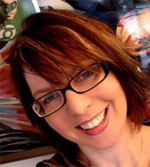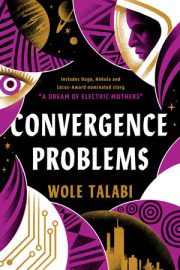The Results of My 100 Day Social Media Blackout
by Monica Valentinelli
 When I decided to “go dark” on Twitter, Facebook and IMs for one hundred days, I wasn’t sure what effect it would have on my web presence. In my previous post, Hunting Down the Value of Social Media, I mentioned what this period has done for my writing and what my initial thoughts were. Now that this period is over, I am happy to share with you some additional lessons and results of this experiment.
When I decided to “go dark” on Twitter, Facebook and IMs for one hundred days, I wasn’t sure what effect it would have on my web presence. In my previous post, Hunting Down the Value of Social Media, I mentioned what this period has done for my writing and what my initial thoughts were. Now that this period is over, I am happy to share with you some additional lessons and results of this experiment.
Here are three questions I asked myself to help me put the results into perspective.
1. Did getting off of social media hurt my book sales or my chances for publication?
No. The new release that I had hit a sales milestone on the retailer’s website, I continued to sell copies of my e-book, and I sold new stories. In terms of “success,” I encountered zero difference between being online-or-off. What did affect my publications, however, was the fact that I was more focused on pitches, submissions and blogging about my work. In the past, I have had publishers tell me that my promotion of new releases on my website was a selling point for them to work with me.
2. Did getting off social media hurt my website traffic?
No. All of my stats went up.
- My RSS feed subscribers increased by twenty percent.
- My newsletter subscribers increased by fifteen percent.
- My overall traffic (comparing the same time frame to the previous) went up by ten percent.
3. Did getting off social media kill my social media presence?
No. My Twitter followers decreased overall by 50 followers whereas my Facebook friends increased by 125 (combing personal and the fan page I set up). Other than that? My stats remained relatively unchanged.
MY CONCLUSION: Good content is more valuable to a writer’s career than social interaction.
Before I went on this blackout, I said that it’s not a good idea to put content that is archive-worthy on Twitter or Facebook. It’s better to house it on your own website because then, by owning the content, you draw people back to “your house.” You’re not partying in someone else’s mansion with your own crystal. To me, these stats prove that. Content is worth something.
This conclusion forced me to re-evaluate why I wanted to be on social media in the first place.
Here were my reasons BEFORE the blackout:
1) Connect with readers
2) Network/Communicate with industry folk
3) Touch base with family and friends
Here’s mine AFTER the blackout:
1) Be a part of the community
That’s it. Why?
Because no human being online is “just” one thing. Which is one of the reasons why I’m watching Google+ so closely; if the neighborhood perspective takes off, that may help authors communicate the different aspects of their creative-and-personal lives online.
I do understand that a lot of publishers are pressuring authors to be active online. I can also see some readers might be demanding that as well. However, I would suggest that you do two things. First? Plan. Have a schedule that complements your release date so you’re not overwhelmed. Second? Be realistic about what the strength of your “brand” is and factor that into your promotion.
As an example: Say I promoted the hell out of a new book I wrote and it’s released the same time as a new novel from Stephen King, who didn’t do much, if any, promotion. Guess who’s going to sell more copies? Stephen King is going to sell more books than I will because he’s Stephen King.
The truth is: there are hundreds of factors that influences a buyer’s behavior online. If I have any recommendation for small and medium-size press publishers, it would be to learn e-commerce and usability inside and out.
While I will make every conceivable effort to promote my works, what I’ve always known is this: a website visitor or an online “friend” is not necessarily the same thing as a reader or a customer who will buy your book. This experiment confirms that. Years of web analytics data confirms that. Now my career efforts have shifted to continue my focus on attracting and retaining readers — not online followers. It takes two seconds to follow an author on Twitter, but it takes a bigger time investment to buy, read and review their books. Sometimes, you may have a reader who won’t buy a book. In this way, a reader and a customer can also be different things, too.
Remember, too, that online marketing and e-commerce both have high learning curves. What you see/read online is often the free version of advice marketers provide to open the door to paying clients. The web changes often and dramatically — social media moreso. One, little change and that entire community you’ve built on Facebook could disappear. This? This is yet another reason why your website is more important than any other tool in your promotional arsenal.
Regardless of what you take from this article, I feel there is another lesson all of us can learn. And that, dear reader, is the lesson of hypersensitivity. By being too connected (or too involved) with a particular subject or interface, like social media, we become hypersensitive to nuances and changes. That hypersensitivity isn’t always good, because the viewpoint may result in overly critical or negative comments that may turn readers and visitors off. It can also directly translate into false assumptions about what someone should (or shouldn’t) be doing.
For myself? I discovered I am hypersensitive to author self-promotion because I’ve been in online marketing so long, I know all the “tricks” and often scratch my head when I see self-professed experts and gurus with no background in the field. However, my perspective doesn’t mean that the author’s self-promotion angle (or publisher’s campaign) is inherently good or bad! What this means, is that I realized I was being hypercritical without even realizing it because I was too engaged. More often that not, most people who work in an internet-related capacity are online more than their customers.
It’s the same thing like teaching someone how to tell a story. While there may be conventions, there is no such thing as “the right way” or “the wrong way.” You don’t “have” to have a certain kind of first sentence. The same is true with your presence online; you have to do what works for you online. You may receive social pressure to avoid engaging in activities like spamming and whatnot, and those are things I would pay attention to because you don’t want to turn yourself into a pariah. (Or, maybe you do for marketing reasons.) But when it comes to being online? I recommend putting your work first.
For more about my experiment, visit the 100 Day Social Media Blackout archive on my website. I hope this article will inspire you to review what you’re doing and either talk to other similarly-minded authors or even your publisher. Don’t be afraid to ask the question: “Why am I online?”
I did. And I couldn’t be happier.


